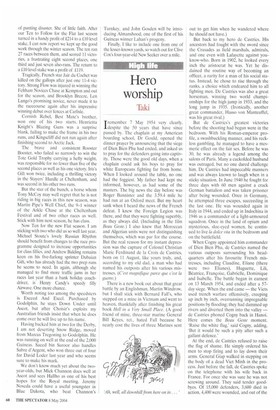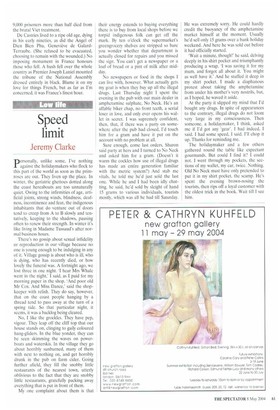Hero worship
Taki
Iremember 7 May 1954 very clearly, despite the 50 years that have since passed by. The chaplain at my American boarding school, Dr Gould, opened the dinner prayer by announcing that the siege of Dien Bien Phu had ended, and asked us to pray for the defenders going into captivity. Those were the good old days, when a chaplain could ask his boys to pray for white Europeans fighting far from home. When I looked around the table, no one had the foggiest. My father had kept me informed, however, as had some of the masters. The big news the day before was Roger Bannister and the 3.59.4 mile he had run at an Oxford meet. But my heart sank when I heard the news of the French defeat. I knew the Foreign Legion was there, and that they were fighting superbly, as they always did. (Including in the film Beau Geste.) I also knew that Moroccan and Algerian units were not distinguishing themselves, which was par for the course. But the real reason for my instant depression was the capture of Colonel Christian Marie Ferdinand de la Croix de Castries, born on 11 August, like yours truly, and, according to my old dad, a man who had named his outposts after his various mistresses. (C 'es: magnifique parce que c'est la guerre.) There is a new book out about that great battle by an Englishman, Martin Windrow, but I shall stick with Bernard Fall's, who stepped on a mine in Vietnam and went to heaven, thankfully after finishing his great book Hell in a Very Small Place. (A good friend of mine, three-star marine General Bill Keyes, ret., hated Fall because he nearly cost the lives of three Marines sent
out to get him when he wandered where he should not have.) But back to my hero de Castries. His ancestors had fought with the sword since the Crusades as field marshals, admirals, and one even with Lafayette against youknow-who. Born in 1902, he looked every inch the aristocrat he was. Yet he disdained the routine way of becoming an officer, a rarity for a man of his social status. Instead, he chose to rise through the ranks, a choice which endeared him to all fighting men. De Castries was also a great horseman, winning two world championships for the high jump in 1933, and the long jump in 1935. (Ironically, another great commander, Hasso von Manteuffel, was his great rival.)
But de Castries's greatest victories before the shooting had begun were in the bedroom. With his Roman-emperor profile, a swashbuckling manner, and his reckless gambling, he managed to have a mesmeric effect on the fair sex. Before he was 30, he was already a legend among the salons of Paris. Many a cuckolded husband was outraged, but no one dared challenge him. De Castries had impeccable manners and was always known to laugh when in a sticky situation. In June 1940 he fought for three days with 60 men against a crack German battalion and was taken prisoner after being wounded. Once in Germany, he attempted three escapes, succeeding in the last one. He was wounded again in Italy in 1944, and ended up in Indochina in 1946 as a commander of a light-armoured squadron. Once in the land of opium and mysterious, sloe-eyed women, he continued to live la dolce vita in the bedroom and on the battlefield.
When Cogny appointed him commander of Dien Bien Phu, de Castries named the various outposts surrounding his headquarters after his favourite French mistresses, including Claudine, Eliane (there were two Elianes), Huguette, Lili, Beatrice, Frangoise, Gabrielle, Dominique and Isabelle. The battle began in earnest on 13 March 1954, and ended after a 57day siege. When the end came — the Viets used trench warfare offensively, creeping up inch by inch, overrunning impregnable positions by flooding; they had dammed up rivers and diverted them into the valley — de Castries phoned Cogny back in Hanoi. Here comes the Beau Geste moment. 'Raise the white flag,' said Cogny, adding, 'But it would be such a pity after such a gallant defence.'
At the end, de Castries refused to raise the flag of shame. He simply ordered his men to stop firing and to lay down their arms. General Giap walked in stepping on the body of a dead Viet Minh in the process. Just before the fall, de Castries spoke on the telephone with his wife back in France. For once she was sure he was not screwing around. They said tender goodbyes. Of 15,000 defenders, 3,600 died in action, 4,400 were wounded, and out of the 9,000 prisoners more than half died from the brutal Viet treatment.
De Castries lived to a ripe old age, dying in his early nineties, as did the Angel of Dien Bien Phu, Genevieve de GalardTerraube. (She refused to be evacuated, choosing to remain with the wounded.) No imposing monument in France honours those who fell. A hush fell over the whole country as Premier Joseph Laniel mounted the tribune of the National Assembly dressed entirely in black. Blame it on my love for things French, but as far as I'm concerned, it was France's finest hour.













































































 Previous page
Previous page